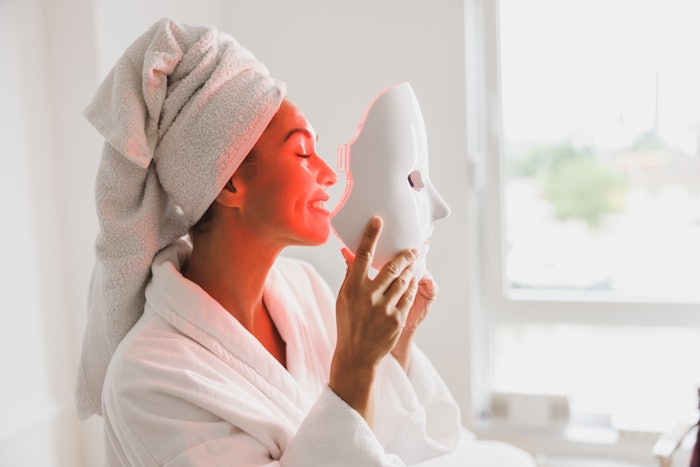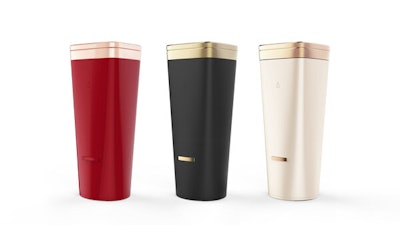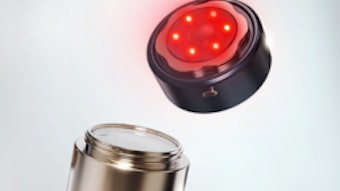
Advancements in technology are transforming beauty from a product-driven industry to a service-oriented one, offering highly personalized solutions to meet evolving consumer expectations. Personalization has become a critical factor in building customer loyalty, with 71% of consumers expecting tailored shopping experiences, according to McKinseya. Notably, nearly 80% of customers are more likely to make repeat purchases or recommend a brand if it delivers personalized interactions.
- AI-Powered Analysis: Tools like L'Oréal’s Perso device analyze skin conditions and environmental factors to create customized serums and treatments. This data-driven approach revolutionizes the traditional trial-and-error method of finding the right products.
 Perso's hardware features a motor system located at the top of the device which moves and compresses the formula from the cartridges at the base of the machine in an upward motion to the dispensing tray above.PRNewsWire, L'oreal
Perso's hardware features a motor system located at the top of the device which moves and compresses the formula from the cartridges at the base of the machine in an upward motion to the dispensing tray above.PRNewsWire, L'oreal - Virtual Try-On: AR technology allows customers to virtually try on makeup and skin care products before purchasing, providing a more interactive and personalized shopping experience. This technology can also be a way for brands to harness valuable insight into their customer demographics.
- Wearable Devices: The demand for smart beauty devices is on the rise. Devices such as smart beauty mirrors and electronic skin care tools provide salon-quality results at home. According to Statista, the number of beauty tech users is projected to reach $515.8 million by 2029.
Global Beauty Tech Market Major Players
According to a report published by The Business Research Company in 2025b, the major companies currently operating in the beauty tech market include Johnson & Johnson, The Procter & Gamble Company, Unilever, Panasonic Corporation, L'Oréal., Henkel AG & Co., The Estée Lauder Companies, Kao Corporation, Ulta Beauty, Sephora, Shiseido, Dyson, Coty Inc., Amorepacific, Mary Kay, Avon, Nu Skin Enterprises Inc, Revlon, Beiersdorf, Foreo AB, Clarins, Tatcha, Quasar Bio-Tech., Glossier, Tria Beauty, Skin Inc., Murad, NuFACE and Dr. Dennis Gross skin care.
Beauty Tech Market Size and Growth by 2025
The beauty tech market has experienced significant growth in recent years. According to The Business Research Company, it is projected to increase from $68.87 billion in 2024 to $79.87 billion in 2025, reflecting a compound annual growth rate (CAGR) of 16.0%b. This surge can likely be credited to the rising adoption of IoT devices, growing investments in beauty tech startups and research, demand for sustainable and clean beauty solutions, as well as advancements in personalized beauty and digital retail transformation.
Beauty Tech Market Growth Outlook
With growing demand for smart devices and tailored beauty routines, this sector is set to transform how consumers approach self-care and cosmetics.
By 2029, the market is anticipated to reach $130.93 billion, growing at a CAGR of 13.2%b. Key drivers of this growth include heightened consumer awareness around clean beauty, the influence of social media and influencers, the popularity of subscription beauty boxes, the rise of e-commerce and global market expansion. Notable trends expected during this period include AI-driven ingredient discovery, innovations in beauty technology, AI-powered skin analysis and lip care, wearable beauty devices and 3D virtual makeup tools. AI-Analysis tools can help improve accuracy when consumers are diagnosing their personal skin concerns.AdobeStock By Prostock-studio
AI-Analysis tools can help improve accuracy when consumers are diagnosing their personal skin concerns.AdobeStock By Prostock-studio
Global Cosmetic Industry recently spoke with Tom Myers, president and CEO of PCPC, to discuss the latest developments shaping the beauty and personal care industry. When it comes to embracing AI innovation, Myers says, “Our industry has long been a leader in innovation–making significant investments in scientific advancements to ensure safe, high-quality products that evolve with consumer needs and technological advancements.”
Myers adds, “Many companies are leveraging AI and other advanced technology tools to offer, among other things, customized skin care and makeup recommendations to meet consumers’ unique skin types, tones and concerns. We anticipate a continued upward trajectory in this area as technology and consumer interest evolve.”
New Advancements in Beauty Tech
AI-Enhanced Fluorescence Photography
 Haut.AI explores the the benefits of using fluorescence photography to uncover skin issues earlier like acne, hyperpigmentation and photoaging.AdobeStock by ArenaPics
Haut.AI explores the the benefits of using fluorescence photography to uncover skin issues earlier like acne, hyperpigmentation and photoaging.AdobeStock by ArenaPics
Haut.AI, an artificial intelligence (AI) company for skin care and beauty applications, has published a new scientific review, focusing on combining fluorescence photography with AI algorithms for non-invasive skin diagnostics that can spot problems before they become visible.
Fluorescence photography is an advanced technique that captures the natural glow emitted by molecules like collagen and porphyrins when the skin is exposed to ultraviolet (UV) light.
The study, “State-of-the-Art in Skin Fluorescent Photography for Cosmetic and skin care Research: From Molecular Spectra to AI Image Analysis”, published in the journal Life (IF 3.2), highlights how this approach can uncover skin issues such as acne, photoaging and hyperpigmentation—frequently before they become visibly noticeable. This would allow skin care experts to diagnose underlying issues earlier, track treatment progress more effectively and offer deeper insights into skin aging, Haut.AI claims.
AI algorithms can analyze the vast data captured by fluorescence images to identify patterns and subtle changes that may be impossible to detect manually. This means that AI can more accurately pinpoint early indicators of skin conditions. AI also has the ability to monitor skin changes over time, providing insights into how skin conditions change and how treatments are responding to various conditions.
Anastasia Georgievskaya, CEO and co-founder of Haut.AI, says, “Fluorescence photography allows us to see what the human eye often cannot and when combined with AI, we’re unlocking entirely new levels of skin diagnostics. We’re looking at a future where skin analysis is multimodal and utilizes different aging models and biomarkers, such as using fluorescence spectroscopy, to make skin analysis more precise and predictive.”
SkinGPT
 SkinGPT uses generative AI to predict how factors like UV exposure or skin care ingredients affect the skin over time, providing accurate simulations—not just filters.Haut.AI
SkinGPT uses generative AI to predict how factors like UV exposure or skin care ingredients affect the skin over time, providing accurate simulations—not just filters.Haut.AI
Georgievskaya says, “At Haut.AI, we work primarily in the B2B space, but we didn’t want to keep our groundbreaking SkinGPT technology locked away. We wanted to give end users access to this virtual try-on experience as soon as possible. By giving everyone access to try SkinGPT, we aim to accelerate the adoption of AI technology in beauty while also making our science available to the public.”
Portable Skin Analyzer with AI
SmartSKN's Muilli AI Dermascope combines precision analysis with custom skin care formulations, setting a new standard in beauty technology.
 SmartSKN Muilli AI DermascopeSmartSKN
SmartSKN Muilli AI DermascopeSmartSKN
SmartSKN's AI leverages data from the Muilli Dermascope to create K-AI formulations, a hyper-personalized skin care line crafted on demand in SmartSKN's Massachusetts lab. With over 25,000 unique formulations possible, each K-AI product is precisely tailored to the user's skin profile. Using hundreds of ingredients researched and developed in Korea, the K-AI line includes essences, serums, ampoules and lotions that address a full spectrum of skin concerns, from dryness and oiliness to sensitivity, pores, blemishes, pigmentation and aging.
Val Neicu, CEO of SmartSKN said, "With the Muilli AI Dermascope, we're giving people the power to understand their skin like never before and access skin care as unique as they are. We aim to make advanced, science-backed skin care accessible, empowering everyone to achieve their healthiest skin and embrace their authentic beauty.”
Revieve’s digital health-beauty-wellness platform also uses AI and AR to offer interactive modules for skin care, makeup and sun protection. Brands including Murad, Ulta Beauty, and Schwan Cosmetics have partnered with Revieve for personalized recommendations and virtual try-ons.
Sampo Parkkinen, CEO of Revieve, says, "Our Next Gen AI Advisors go beyond the boundaries of traditional personalization by integrating comprehensive Gen AI capabilities. With Gen AI-powered conversational assistants and Beauty Fusion, we offer dynamic personalized guidance that fosters deep emotional connections. This approach ensures every consumer receives tailored advice—whether for skin care, makeup or hair care—creating a truly immersive, relationship-driven beauty journey."
Paul Tepfenhart, global director of retail and consumer industries at Google Cloud, adds, "By leveraging the power of both consumer insights and data, brands can build and execute data-driven strategies that drive higher engagement and loyalty. Together, we’re redefining how brands connect with consumers, building more meaningful and lasting relationships in the beauty and retail industries.”
Generative AI is poised to transform industries, with the beauty sector offering a striking example of its potential. According to McKinsey, generative AI could contribute an additional $9-10 billion to the global economy, driven significantly by advancements in personalized skin care.
Stacey Cuningham, director of product development & regulatory affairs, GPI Beauty says, “I believe biotechnology will play a pivotal role in the future of skin care by enabling the development of personalized formulas that cater to the unique needs of individual skin types. With bio-fermented and lab-grown ingredients, biotech not only aligns with sustainability goals but also offers ethical alternatives to traditional sourcing methods. This shift promises a more customized, environmentally conscious approach to beauty product development.”
With the rise of AI technology, beauty companies are able to utilize data and algorithms to create customized skin care products that cater to consumers’ specific needs and concerns. This not only streamlines the product development process, but also provides more effective solutions for individual customers.
AI-powered Ingredient Discovery Platform
Debut’s BeautyORB is an AI-powered innovation engine that provides a new way to discover novel ingredients for best-in-class claims for beauty brands, from a typical time horizon of several years to two Debut ingredients launched each year. The genomics-based AI platform, which is on par with pharmaceutical-grade technology, has already fueled the creation of groundbreaking ingredients addressing inflammaging, epidermal barrier repair and longevity, with brightening, anti-aging and scalp care ingredients already in the pipeline.  BeautyORB discovers new ingredients by screening 50 billion molecules for their ability to turn on cellular pathways within skin, a process that has never previously been possible in beauty.AdobeStock By Виктория Попова
BeautyORB discovers new ingredients by screening 50 billion molecules for their ability to turn on cellular pathways within skin, a process that has never previously been possible in beauty.AdobeStock By Виктория Попова
BeautyORB discovers new ingredients by screening 50 billion molecules for their ability to turn on cellular pathways within skin, a process that has never previously been possible in beauty. Debut’s AI platform has already identified three novel, patented ingredients that achieve the highest beauty standards including scientifically-proven, clinically-tested and 100% bio-based ingredients that beat existing benchmarks.
“With our advanced AI platform and understanding of skin biology, we can rapidly create brand new ingredients through computational compound prediction. This allows us to activate specific aspects of skin biology while also discovering new or improved cellular pathways for enhanced clinical claims,” says Joshua Britton, Ph.D, founder and CEO of Debut.
Britton adds, “We don’t have to rely on an array of existing ingredients to test against specific claims, and we don’t have to go into the field to find rare ingredients in plants. All this can be done at the click of a button, cutting out years from the innovation cycle and accessing ingredients that no one has seen before. We can turn on and off molecular pathways differently and use AI to discover what molecules can affect those pathways. The result is a rich, proven and growing pipeline of novel ingredients with the strongest clinical results for our customers, allowing brands to win on product performance rather than marketing.”
Active Applicators
 Nuon Unveils Cutting-Edge Beauty Devices Revolutionizing Skincare at Cosmoprof North America and LuxePack LANuon Medical Technologies
Nuon Unveils Cutting-Edge Beauty Devices Revolutionizing Skincare at Cosmoprof North America and LuxePack LANuon Medical Technologies
Nuon proudly showcased its new Secondary + Active Applicator product categories at this year's Cosmoprof Miami and LuxePack LA events, combining advanced technology and precision design for transformative results. Nuon has a wide range of beauty devices available that feature various advanced technologies, including light therapy, microcurrents, PEMF, heat and ultrasonic vibrations.
Secondary Applicators
These devices utilize advanced technologies to improve the absorption of skin care active ingredients. For example, Nuon’s Eye Cream Applicator is a skin care applicator that combines the benefits of micro-current massage and LED light therapy. This advanced applicator is placed directly onto standard cosmetic tubes, allowing for precise and effective application of eye creams and serums. The micro-current massaging effect not only optimizes the absorption and effectiveness of the skin care products, but also turns routine treatments into a comfortable and luxurious experience.
 Nuon's TrioCare Applicator, featuring anti-wrinkle red light therapy, heat, and acne-fighting blue light therapy.Nuon Medical Technologies
Nuon's TrioCare Applicator, featuring anti-wrinkle red light therapy, heat, and acne-fighting blue light therapy.Nuon Medical Technologies
Another beauty device from Nuon that is driving innovation in the industry is the TrioCare Applicator Red light (630 nm) and blue light (465 nm) with heating target wrinkles and acne, delivering visibly smoother, clearer skin. Acne-Fighting Blue Light Therapy (415 nm) Targeted blue light therapy for acne issues, using a precise 415 nm wavelength to reduce inflammation and restore clear, healthy skin. This device uses a unique heating feature that enhances the effects of both light therapies and promotes skin metabolism.
Footnotes:
b https://www.thebusinessresearchcompany.com/report/beauty-tech-global-market-report














